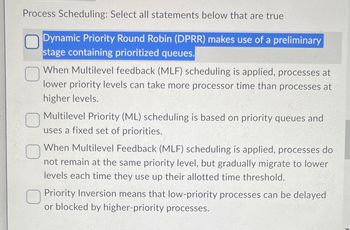
Database System Concepts
7th Edition
ISBN: 9780078022159
Author: Abraham Silberschatz Professor, Henry F. Korth, S. Sudarshan
Publisher: McGraw-Hill Education
expand_more
expand_more
format_list_bulleted
Topic Video
Question

Transcribed Image Text:Process Scheduling: Select all statements below that are true
Dynamic Priority Round Robin (DPRR) makes use of a preliminary
stage containing prioritized queues.
When Multilevel feedback (MLF) scheduling is applied, processes at
lower priority levels can take more processor time than processes at
higher levels.
Multilevel Priority (ML) scheduling is based on priority queues and
uses a fixed set of priorities.
When Multilevel Feedback (MLF) scheduling is applied, processes do
not remain at the same priority level, but gradually migrate to lower
levels each time they use up their allotted time threshold.
Priority Inversion means that low-priority processes can be delayed
or blocked by higher-priority processes.
Expert Solution
This question has been solved!
Explore an expertly crafted, step-by-step solution for a thorough understanding of key concepts.
Step by stepSolved in 2 steps

Knowledge Booster
Learn more about
Need a deep-dive on the concept behind this application? Look no further. Learn more about this topic, computer-science and related others by exploring similar questions and additional content below.Similar questions
- A concurrent application is required to take use of a multiprocessor.True or False.arrow_forwardReal Time Scheduling: Select all statements below that are true EDF scheduling assigns the highest priority to a process with the smallest remaining time until its deadline. RM scheduling assigns a higher priority to processes with shorter periods. Rate Monotonic (RM) scheduling works by dividing the total amount of time available into an equal number of shares, and then each process must request a certain share of the total when it tries to start. If a process has period p, it is activated every p units of time. A real-time system is schedulable under Earliest Deadline First (EDF) when its overall CPU utilization is less than or equal to 1. A real-time system is schedulable under RM when its overall CPU utilization is less than 1.arrow_forwardPriority Scheduling resembles Shortest Job First Scheduling in what ways?arrow_forward
- Assume that there are the following processes in the deadline scheduler queue: Process Arrival Runtime Period Deadline 1 0 2 12 10 2 2 4 20 16 3 4 3 15 14 Complete the following schedule so each of the processes adheres to the deadline policy by replacing a dot with a process number (as necessary): TIME: 01234567890123456789012345678901234567890123456789 PROCESS: 112222333.......................................arrow_forwardReal-time Scheduling: Choose all true assertions. Rate Monotonic (RM) scheduling divides time into equal parts and requires each process to seek a portion upon starting. RM schedules real-time systems with CPU utilization below 1. When CPU utilization is less than 1, Earliest Deadline First (EDF) may schedule a real-time system. A process is initiated every p time unit. RM scheduling prioritizes shorter processes. EDF scheduling prioritizes processes with the shortest time frame.arrow_forwardDesign an Algorithms (psuedo c++) An algorithm that solves scheduling problem by brute forcearrow_forward
- Name 2 scheduling algorithm’sarrow_forwardBounded waiting requires that \A bound must exist on the number of times that other processes are allowed to enter their critical sections a) true b) falsearrow_forwardExercises - Scheduling Score: 7.8/20 3/10 answered Question 4 Using the priority list T4, T1, T7, T9, T8, T6, T2, T5, T3, schedule the project below with two processors. Task Time Required Tasks that must be completed first T1 6 T2 7 T3 9 T4 10 T1 T5 12 T1 T6 2 T2, T3 T7 6 T4, T5 T8 6 T5, T6 T9 11 T5, T6 Task 5 is done by Select an answer starting at time Task 8 is done by Select an answer starting at time The finishing time for the schedule is Progress 0.arrow_forward
arrow_back_ios
arrow_forward_ios
Recommended textbooks for you
 Database System ConceptsComputer ScienceISBN:9780078022159Author:Abraham Silberschatz Professor, Henry F. Korth, S. SudarshanPublisher:McGraw-Hill Education
Database System ConceptsComputer ScienceISBN:9780078022159Author:Abraham Silberschatz Professor, Henry F. Korth, S. SudarshanPublisher:McGraw-Hill Education Starting Out with Python (4th Edition)Computer ScienceISBN:9780134444321Author:Tony GaddisPublisher:PEARSON
Starting Out with Python (4th Edition)Computer ScienceISBN:9780134444321Author:Tony GaddisPublisher:PEARSON Digital Fundamentals (11th Edition)Computer ScienceISBN:9780132737968Author:Thomas L. FloydPublisher:PEARSON
Digital Fundamentals (11th Edition)Computer ScienceISBN:9780132737968Author:Thomas L. FloydPublisher:PEARSON C How to Program (8th Edition)Computer ScienceISBN:9780133976892Author:Paul J. Deitel, Harvey DeitelPublisher:PEARSON
C How to Program (8th Edition)Computer ScienceISBN:9780133976892Author:Paul J. Deitel, Harvey DeitelPublisher:PEARSON Database Systems: Design, Implementation, & Manag...Computer ScienceISBN:9781337627900Author:Carlos Coronel, Steven MorrisPublisher:Cengage Learning
Database Systems: Design, Implementation, & Manag...Computer ScienceISBN:9781337627900Author:Carlos Coronel, Steven MorrisPublisher:Cengage Learning Programmable Logic ControllersComputer ScienceISBN:9780073373843Author:Frank D. PetruzellaPublisher:McGraw-Hill Education
Programmable Logic ControllersComputer ScienceISBN:9780073373843Author:Frank D. PetruzellaPublisher:McGraw-Hill Education

Database System Concepts
Computer Science
ISBN:9780078022159
Author:Abraham Silberschatz Professor, Henry F. Korth, S. Sudarshan
Publisher:McGraw-Hill Education

Starting Out with Python (4th Edition)
Computer Science
ISBN:9780134444321
Author:Tony Gaddis
Publisher:PEARSON

Digital Fundamentals (11th Edition)
Computer Science
ISBN:9780132737968
Author:Thomas L. Floyd
Publisher:PEARSON

C How to Program (8th Edition)
Computer Science
ISBN:9780133976892
Author:Paul J. Deitel, Harvey Deitel
Publisher:PEARSON

Database Systems: Design, Implementation, & Manag...
Computer Science
ISBN:9781337627900
Author:Carlos Coronel, Steven Morris
Publisher:Cengage Learning

Programmable Logic Controllers
Computer Science
ISBN:9780073373843
Author:Frank D. Petruzella
Publisher:McGraw-Hill Education